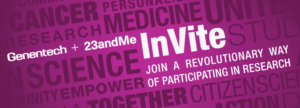
Editors note June 2013: Suzan “Suzie” Mickey lost her battle with cancer earlier this month. An advocate for better treatments for women with metastatic breast cancer, Suzie inspired many with her attitude. Our condolences go out to her family.
Positive, helpful, and upbeat. These aren’t words you would expect to describe someone about to start another round of chemo treatment. However, in the case of Suzan Mickey, they are very apt. Mickey is a participant in the 23andMe and Genentech InVite study on bevacizumab (also known as Avastin ®) and metastatic breast cancer. (Avastin ® is not approved by the FDA for treatment of breast cancer.)
A forty-five-year-old wife and mother of two pre-teen kids, Mickey has many interests, including an unusual predilection for antiques. Finding beauty in a broken and neglected piece of furniture, she says, is a metaphor for finding hope within a devastating diagnosis. Where many people would just see the peeling paint on an old cupboard, Mickey sees opportunity; where many people would see only the bleakness of cancer, Mickey sees blessings.
“I have to live my remaining days with cancer, and I am choosing to see the blessings that come with it as opposed to being focused on the challenges,” she said. “Although my diagnosis is not something I would wish for anyone, it has brought with it many incredible gifts. The love and support I have received from family and friends is humbling. I now focus my time engaged with those that I love, and I never hesitate to experience something new. The little things really do not matter…spending time with those that you love absolutely does.”
![]() If you have taken bevacizumab as a breast cancer treatment in the past, you may be eligible to participate in the InVite Study.
If you have taken bevacizumab as a breast cancer treatment in the past, you may be eligible to participate in the InVite Study.

Furthermore, all 23andMe customers can participate in other scientific research through 23andMe’s research surveys. Not yet a customer? Visit our store or learn more.
Given Mickey’s ability to see opportunity in even the hardest situations, it isn’t surprising that she is helping cancer research. Despite having stage 4 breast cancer, Mickey is cheerful and wants to help other women fighting breast cancer. Mickey joined the InVite study because she was interested in helping researchers learn more about bevacizumab and if genetics played a role in how patients responded to treatment.
Although genetics may be one contributing factor to treatment response, Mickey and her doctors believe that the healthy diet she adopted may have also played an important role in her response. After researching the impact of nutrition on chemo treatment response, she switched to a diet with no animal proteins, no dairy, no gluten, and no refined sugar, and instead ate lots of whole grains, legumes, fruits and veggies that are high in fiber. Mickey even studied at the Institute of Integrative Nutrition in order to become a holistic health coach, hoping to share this important nutrition information with other women facing chemo. Being diagnosed with cancer, she said, feels like the world is spinning out of control. Mickey believes that the foods she ate allowed her to stay strong and produce less estrogen, creating an optimal environment within her body which she feels gave the medicines their best chance at success. Thus, regardless of one’s genetic makeup, she sees a healthy diet as one positive way to take control.
In addition to encouraging good nutrition, Mickey says that she encourages other women diagnosed with breast cancer not to fear. And certainly, with her cheerfulness, enthusiasm, and concern for others, Suzan Mickey is living proof that a life with breast cancer can instead be a life of strength and hope.



